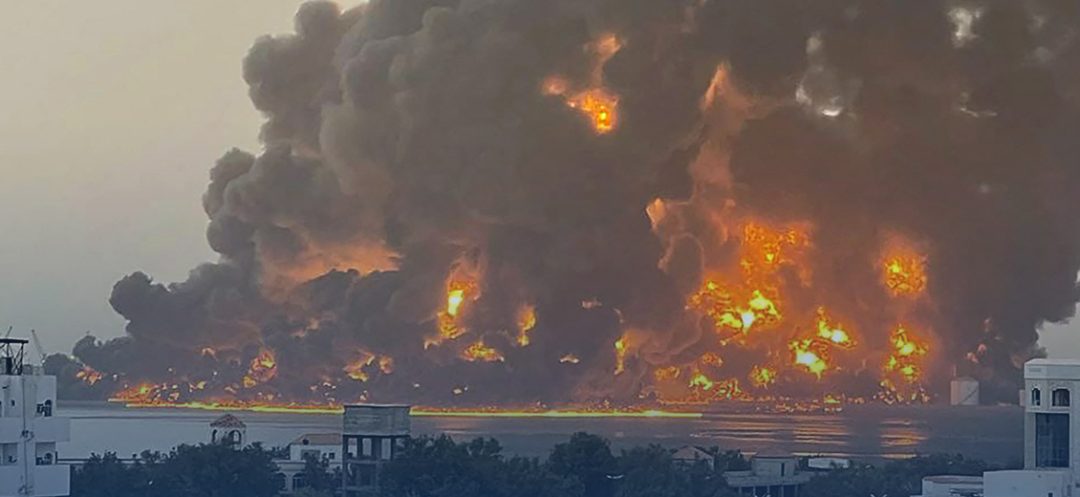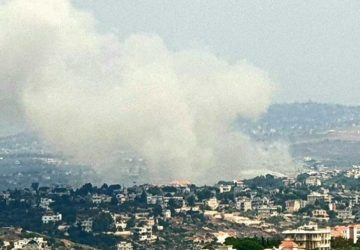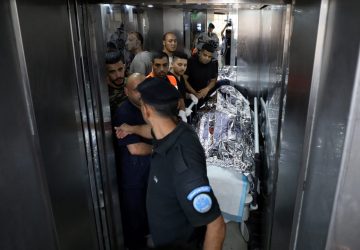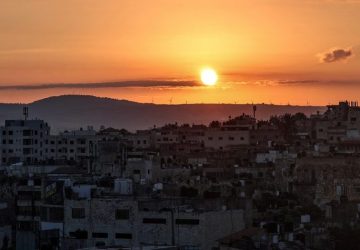Israeli warplanes killed three people in the Houthi-controlled Yemeni port of Hodeida, the Houthi’s said Sunday after the group’s deadly drone attack in Tel Aviv.
The strikes on the vital port, which triggered a raging fire and plumes of black smoke, are the first claimed by Israel in the Arabian peninsula’s poorest country, about 2,000 kilometres (1,300 miles) away, analysts said.
“The blood of Israeli citizens has a price,” Israeli Defence Minister Yoav Gallant said, adding more operations against the Houthis would follow “if they dare to attack us”.
Gallant said the Hodeida strikes were also a warning to other Iran-backed armed groups around the Middle East that have claimed attacks on Israel during the Gaza war.
The Israeli strikes killed three people and wounded 87, the health ministry said in a statement carried by Houthi media.
Prime Minister Benjamin Netanyahu warned “anyone who harms us will pay a very heavy price”, after Friday’s drone attack in Tel Aviv killed an Israeli civilian.
But Houthi politburo member Mohammed al-Bukhaiti swiftly threatened to “meet escalation with escalation”, in a social media post.
Israel’s military said Sunday it intercepted a missile fired from Yemen, the latest in a series of Houthi weapons downed off the Red Sea resort town of Eilat in recent months.
The Houthis’ Lebanese ally, Hezbollah, warned that the Israeli strikes on Hodeida marked a dangerous turn nine months into the Gaza war.
“The foolish step taken by the Zionist enemy heralds a new, dangerous phase,” said the group, which has exchanged nearly daily fire with the Israeli army throughout the war.
‘Brutal aggression’
In a statement on social media, top Houthi official Mohammed Abdulsalam reported a “brutal Israel aggression against Yemen”.
An AFP correspondent in Hodeida reported hearing several large explosions and seeing smoke over the port.
Footage aired by the rebels’ Al-Masirah television, which AFP could not independently verify, showed casualties being treated in hospital, many of them bandaged and lying on stretchers in packed rooms.
The oil ministry sought to reassure Yemenis that there are “large and sufficient amounts of oil reserves” in a statement published by the Houthi-run Saba news agency.
Yemen aid lifeline fears
The United States, which along with Britain has carried out several rounds of air strikes against the Houthis in an attempt to put an end to their attacks on shipping in the Red Sea, said it played no part in Saturday’s strikes.
Separately, the US Central Command (CENTCOM) said Saturday it “successfully destroyed” a Houthi drone during the past 24 hours over the Red Sea.
Saudi Arabia distanced itself from the Yemen strikes, with a defence ministry spokesman saying Riyadh had “no links to or involvement in targeting Hodeida”.
“The kingdom will not allow its airspace to be infiltrated by any party,” said Brigadier General Turki al-Maliki.
Hodeida port, a vital entry point for imports and international aid for Houthi areas of Yemen, had remained largely untouched through the decade-long war between the Houthis and the internationally recognised government propped up by neighbouring Saudi Arabia.
The Houthis control swathes of Yemen, including much of its Red Sea coast, and the war has left millions of Yemenis dependent on aid supplied through the port.
“Traders now fear that this will exacerbate the already critical food security and humanitarian situation in northern Yemen, as the majority of trade flows through this port,” said Mohammed Albasha, senior Middle East analyst for the US-based Navanti Group.
UN chief Antonio Guterres had appealed for “maximum restraint” after the Tel Aviv drone strike to avoid “further escalation in the region”.
With AFP





